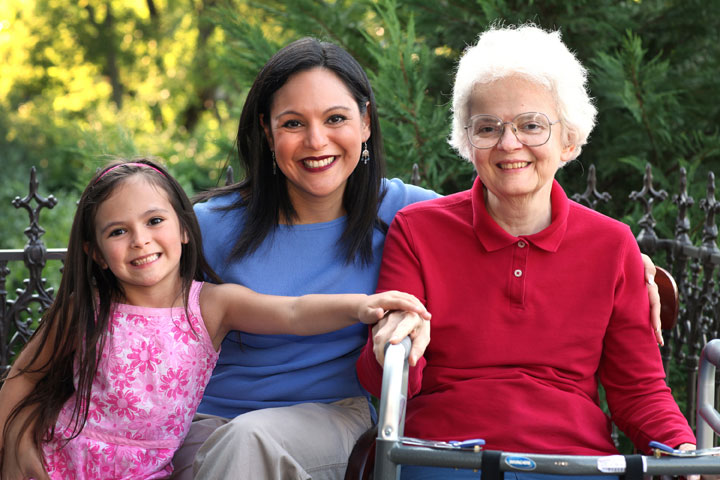July 14, 2011

By Kenneth Matos
Senior Research Associate
Families and Work Institute
Phone: 212-716-1846
Email: kmatos@familiesandwork.org
Since 2009, 20 states and 11 cities have designated July as Sandwich Generation Month, to recognize the dedication of Americans who are caring for their children and their own aging parents at the same time. Currently about 7 percent of employed men and women, or about 9.8 million people out of the 139.3 million employed persons in June 2011, are official members of the sandwich generation, but a much higher proportion of Americans have already experienced or will eventually experience this stressful combination of care-giving responsibilities. With the number of Americans aged 65 and older projected to increase from 40 million in 2010 to 88.5 million by 2050, the ranks of sandwich generation caregivers are poised to expand significantly.
- Among people who currently only have child care responsibilities, more than a quarter have provided elder care in the last five years and almost half (44 percent) expect to provide elder care in the next five years
- Among people with current elder and child care responsibilities, 86 percent expect to still be providing elder care over the next five years.
What else do we know about employed Americans providing care for their elders while supporting their own children? Here are some surprising facts from researchers at the Council on Contemporary Families and the Families and Work Institute:
1. The sandwich generation is not really a single generation.
- The majority (55 percent) of people with elder and child care responsibilities are between 28 and 42 years old. But many are older (38 percent are between 43 and 61 years old) or younger (7 percent are younger than 28).
- Children in sandwich generation families also range in ages: 30 percent are under 6 years old, 32 percent between 6 and 12 years old, and 39 percent between 13 and 17 years old.
2. Sandwich generation caregivers live in diverse family situations.
- Almost half (47 percent) of people with elder and child care responsibilities are caring for more than one elder, while almost 60 percent are caring for multiple children. Over a quarter of sandwiched people (28 percent) are caring for multiple children and more than one elder.
- Of employed persons simultaneously caring for elders and children, slightly more than half are women (54 percent), compared with 47 percent of employed men. Interestingly, these sandwiched women are less likely to have a spouse/partner than their male counterparts. Only 66 percent of women with child care and elder responsibilities, compared to almost 90 percent of sandwich generation men, are married or living with a partner.
- More than three quarters of sandwiched people who live with a spouse/partner are in a dual-earner couple. Of the 23 percent of sandwiched single earners, 81 percent are men and 19 percent are women.
3. Sandwiched employees spend as much time on their work responsibilities (an average of 44 hours a week) as people without any caregiving responsibilities (42 hours a week), even though they spend more time on total family care.
4. Sandwiched families cover more than a third of the overall cost of long-term elder care through their unpaid or donated time. They also contribute significant out-of-pocket funds, even though they earn less than those without care-giving responsibilities.
- In 2004, the total cost of long-term care services for the elderly, including unpaid or ‘donated’ time, was $211.4 billion. The unpaid time that families and other uncompensated caregivers donated to elder care covered 36 percent of total costs. By comparison, Medicare and Medicaid combined paid for 38 percent of total costs.
- Sandwiched families (median income $67,671) have lower incomes than families who do not have any care-giving responsibilities ($84,000).
For Further Information
Most of the data in this fact sheet is from the 2008 National Study of the Changing Workforce conducted by the Families and Work Institute. See also Older Americans Month Fact Sheet, Council on Contemporary Families and Donnell, M., Kim, A. and Kasten, J., Unsticking the Sandwich Generation: Help for Families Caring for Aging Parents (Washington, DC: Third Way, 2007).
Further information can also be found at the Sandwich Generation Resource Group website: http://www.sandwichgenerationmonth.com/library.php
For information on workplace practices and social policies that support sandwich generation workers, contact CCF Board Member, Professor of Sociology, Jennifer Glass, University of Iowa, jennifer-glass@uiowa.edu
For information on racial and ethnic variations in elder care, contact Naomi Gerstel, Dept. of Sociology, University of Massachusetts. Phone: 413-545-5976, Naomi.gerstel@gmail.com
The Council on Contemporary Families is a non-profit, non-partisan organization of family researchers, mental health and social practitioners, and clinicians dedicated to providing the press and public with the latest research and best practice findings about American families. Founded in 1996 and based at the University of Miami, the Council’s mission is to enhance the national understanding of how and why contemporary families are changing, what needs and challenges they face, and how these needs can best be met. For more information, or to receive future briefing papers from the Council, contact Stephanie Coontz, Director of Research and Public Education of CCF and Professor of History and Family Studies at The Evergreen State College. coontzs@msn.com. Phone 360 352-8117. Cell: 360 556-9223
